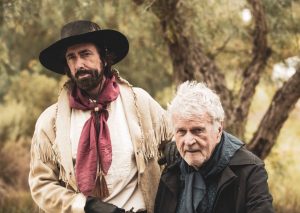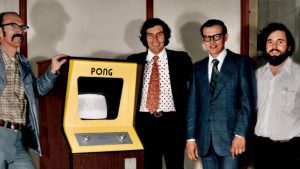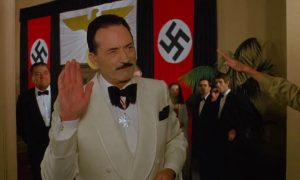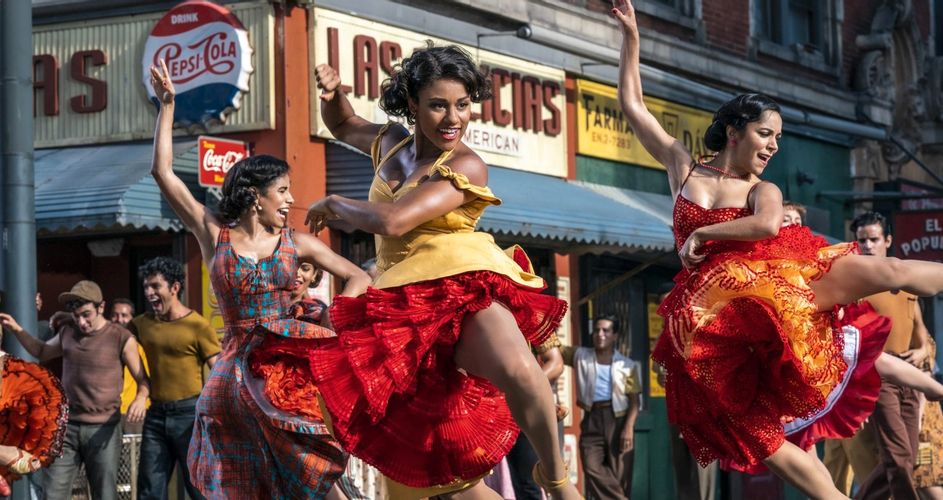
TONIGHT…..TONIGHT…..
Throughout the years, Hollywood has seen many famed directors rise to become legendary within the filmmaking industry; ascending on their own meticulous directorial merits when approaching a motion picture. Alfred Hitchcock, Stanley Kubrick, Clint Eastwood, Cecil B. DeMille, and Francis Ford Coppola are just some of the names of the great ones that have made their mark in Hollywood and etched their names in the illustrious tapestry of movies. While a new generation of directors have emerged in modern times (i.e. Christopher Nolan, Peter Jackson, and Guillermo Del Toro, etc.), these legendary directors have been both respected by their peers and the entire Hollywood community as well as moviegoers everywhere. Such is the cases with director Steven Spielberg, who is among the noteworthy ranks of these “great directors”, becoming a classic household name that many (cinephiles and causal movie watchers) have come to known and the feature films he’s directed. His films, including such iconic movies like Jaws, Close Encounters of the Third Kind, E.T. the Extra-Terrestrial, Jurassic Park, and Raiders of the Lost Ark, have become cinematic staples in not just in the realm of Hollywood, but in the history of movies. Spielberg has even delved into theatrical motions pictures that draw inspiration from very humanistic issues (society, war, terrorism, civil rights, identity, etc.), with films like Saving Private Ryan, The Color Purple, Schindler’s List, Amistad, Lincoln, A.I. Artificial Intelligence, The Post. BFG, and Ready Player One. Beyond the directorial chair, Spielberg has done (on several occasions) acted as a producer, executive producer, and even as a screenplay writer. He was also the co-founders of the movie studio DreamWorks Studio. Thus, with his fame growing and his film reputation amongst many being palpable (and celebrated) it’s no reason why Spielberg is considered one of the most powerful directors in Hollywood’s film history. Now, 20th Century Fox (along with TSG Entertainment and Amblin Entertainment) present Spielberg’s next theatrical feature installment, with the musical Broadway extravaganza remake of West Side Story. Does this famed director’s first attempt at a musical worth a glance (and the hype) or is it a far cry (and ultimately bland endeavor) from the classic Broadway show?
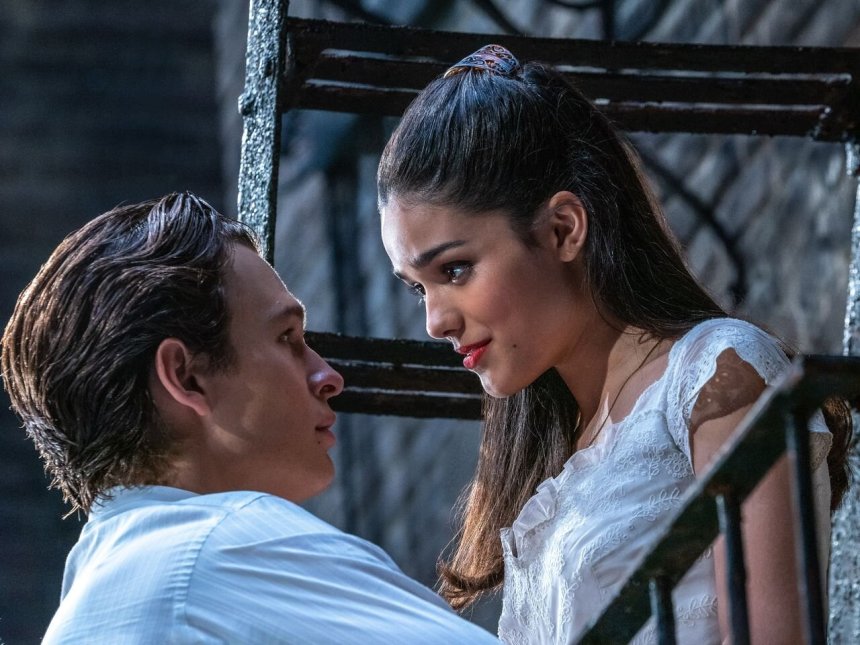
THE STORY
In the slums of New York City, the rougher areas of the neighborhood are being removed for a different future appeal, leaving street gang such as the Jets, led by ringleader Riff (Mike Faist), frustrated with the changing face of his streets, declaring war on their Puerto Rican rivals, the Sharks, led by head honcho Bernardo (David Alvarez). The Jets once had the muscle in Tony (Ansel Elgort), but he’s opted on the gang for a more reformed way of life, fresh out of prison and working for Valentina (Rita Moreno), trying to put his volent past behind him. Accepting an invite to a local dance, Tony is quickly wowed by the sight of Maria (Rachel Ziegler), who is actually Bernardo’s sister, with the pair immediately attracted to each other while recognizing their cultural divisions. Determined to win Maria’s hand and heart, Tony put everything into wooing the young girl, but the influence of Riff looms large, with the young man pulled into a final turf war between the two gangs; one that set everyone on a collision course of love, betrayal, and death.
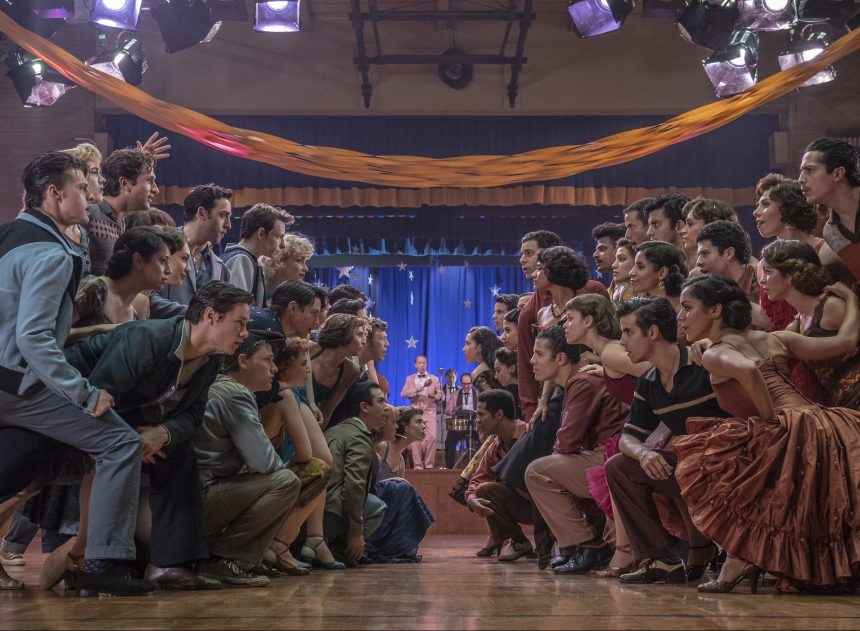
THE GOOD / THE BAD
Borrowing my lines from my review for Ready Player One…. being an amateur aficionado in the cinematic world of movies, I’ve come to appreciate (and admire) some of the great directors of Hollywood. While many will eternally debate on which one is the best, there’s no denying the fact that these directors (numerous and collectively) have proven to be adept in their crafting of feature films and bring powerful and memorable cinematic storytelling to both the industry and to moviegoers everywhere. Personally, Steven Spielberg is definitely in my top 5 favorite directors. Not just because of him being noteworthy in Hollywood’s upper echelon of actors, producers, and directors, but because of his quality in the films that he does (and the memorable stories that they tell). As the saying goes “the proof is in the pudding”. I mean, movies like Jaws, Jurassic Park, and E.T., are like stuff of movie legends in my time, especially since I grew up with them. Still, even some of Spielberg’s recent work, with some stating that he’s slightly lost his “movie magic”, have produced some great feature films to watch, personally finding Ready Player One and Lincoln to be wholesome and quality cinematic stories to watch. All in all, Spielberg has undoubtedly become one of the most influential directors in Hollywood, a testament to his style of filmmaking and the feature films that some have been considered “timeless”.
This circles back to my current review for West Side Story, a 2021 musical feature film of the Broadway musical of the same name. In reflection of 2021, I think that the year should’ve been called “the year of musicals” as there was a plethora of musical feature films that were released and capitalized on singing and dancing for a cinematic purpose of moviemaking storytelling, including the releases of Dear Evan Hansen, In the Heights, Tick, Tick….BOOM!, Encanto, and Everybody’s Talking About Jamie. So, having an remake motion picture of one of the most iconic Broadway music showstoppers wasn’t a stretch of the imagination, with West Side Story ripe for an second updated film adaptation. A few years back, I do remember hearing that Spielberg announced that his next project (after completing Ready Player One) would be directing a remake of West Side Story. Spielberg doing a musical? It was quite baffling thing to hear, but I was interested in seeing what the director would have to offer. It was until a few months ago when the film’s movie trailer dropped; showcasing the first footage from the upcoming musical, which looked incredible. Originally, West Side Story was going to be released for a December 2020 theatrical release, but, due to the on-going effects of the COVID-19 pandemic, the film was delayed an entire year, with a final date set for December 10th, 2021. So, while I did see the movie during its opening night, I, unfortunately, didn’t get the chance to get my review done for quite some time, due to my busy work schedule and my back catalogue of other movie reviews that had to complete first. So, while I’m on vacation, I’ve been pushing out some reviews on my blog and I’m finally ready to share what I thought about this updated musical. So…what did I think of this film? Well, I really liked it. Despite a few problems along the way, Spielberg’s West Side Story is a fantastic and magnetic musical endeavor that still celebrates the original format of the iconic Romeo & Juliet love tragedy, yet updating the cinematography and story elements to make the movie speak volumes for a new generation. While the 1961 feature is still iconic and beloved, I do believe that this adaptation is slightly superior. I know that is a bit unheard of, but a remake that’s actually better than the original….and that’s a good thing!
I will admit that prior to seeing the new film, I didn’t get the chance to see the beloved 1961 version of West Side Story. That being said, I did get the chance to see the 1961 one several weeks after the seeing the 2021 one (I rented it on Vudu). So, in my review…. I will make a little bit of a comparison between the two film adaptations.
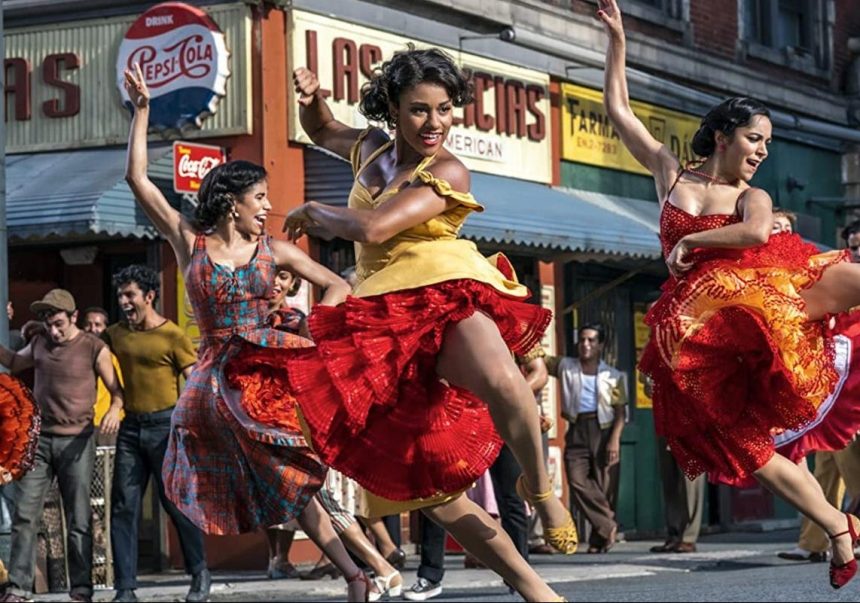
I do have to admit that I find it interesting that Spielberg would want to do a musical. Well, at the same time, I can see why. Given the amount of variety that the acclaimed director has done over the years from science fiction, to action, to adventure, to thrillers, to fantasy, and even to historical drama. So, delving into the musical realm of filmmaking for his latest theatrical motion picture was indeed something new and different as well as being ambitious for Spielberg to tackle. The result is…as the saying goes…proof in the pudding, with his remake of the classic musical to resonating the same (if not more) charisma, energy, and lyrical presence of the theatrical caliber of that of the 1961 film. Don’t get me wrong…the 1961’s West Side Story is remarkable, iconic, and true timeless classic, which is why it has been always revered for the past 60 years. That being said, Spielberg approaches the Broadway musical by trying to beat out what made the 1961 version memorable, but rather enhancing the narrative of West Side Story and showcasing the new visual cinematics and updated filmmaking techniques to enrich the classic story. Speaking of story, the film’s screenplay, which was penned by Tony Kushner elevates and expands upon certain characters and elements from narrative, which helps flesh out certain details that were a bit scant and / or vague mentioned in the 1961 film. This certainly brings a new dynamic to this new remake of the musical, but fans of West Side Story shouldn’t be upset by this. Spielberg (along with Kushner) still keep the movie’s story, plot, and subtext relatively the same, with narrative still being a modernized retelling of a Romeo & Juliet scenario of two star-crossed lovers, rival gangs, tragedy, and lyrical songs. That portion is left untouched and is sort of the “bread and butter” of what makes West Side Story…. well…. West Side Story, Spielberg merely tweaks a few moments for character / story substance and gives the film a well-deserve face-lift through visual and technical achievements. Spielberg also doesn’t get too lost within the musical; something that directors might do when approaching a new genre for directorial works and always does keep one eye firmly focused on the task at hand. Overall, while it’s not exactly perfect, the movie almost reaches that point; finding Spielberg’s first attempt at a big Hollywood musical feature film to a winning score and making his version of West Side Story one for the cinematic history books.
Naturally, one of the big highlights of West Side Story are the various songs that play out throughout the story, with some becoming treasured classics of Broadway showtunes. Spielberg’s film still keeps those beloved songs intact for his 2021 version and provides a harmonious musical journey that still makes the story (and music) feel just as important as it more than a decade ago. As a whole, the songs are still relatively the same, with a sense of jazz undertone vibe that’s mixed with large portion of old school Broadway style musicals. This, of course, might feel slightly dated to some, especially with modern style of musicals nowadays (i.e. The Greatest Showman, Hamilton, In the Heights, etc.), but to fundamentally alter the original songs for a modern audience would unjustifiable. So, it sort of counterbalances it all, with the 2021 movie retaining the original motifs, flourishes, underscore, and lyrics that many have come to love from this famous musicals. Songs like “Tonight”, “I Feel Pretty”, and “Gee, Officer Krupke” are still such as heartfelt, lighthearted, and humorous to behold in the movie, with most of the cast up to the chance to belt out the composed songs in a timely manner. However, the biggest memorable piece of Spielberg’s West Side Story would be scene that feature “America”. Originally performed on the rooftops of an apartment building in the 1961 movie, Spielberg’s updated remake takes to the streets for a wildly color and visually creative rendition of the song that is quite spirited and energetic. Definitely my favorite part of the movie…. hands down! Also, I do have to mention that all the choregraphed dancing in these musical scenes are wonderous to behold; capturing the beauty of the Broadway theater production and translating it for a cinematic musical experience. As a side-note to that comment, I also mention all of the extra dancers that are part of the Jets and Sharks gang and how they help elevate the film’s visual flair. They might not be as strong as some of the main cast (more just physical characters than well-rounded dynamic ones), but all involved are relatively good and mesh together well with whatever scenes that calls upon them.
In the technical and overall presentation category, the 2021 West Side Story is vastly superior to the 1961 version and shines immensely because of the level of visual achievements that the production showcases and displays in cinematic fashion. Spielberg’s theatrical films always have great depth in visual peripherals and background / setting aesthetics, which always speaks volumes in his storytelling. His interpretation of West Side Story is no different; finding a great spectacle artistry at work as the movie looks and feels both life-like by showing gritty and aged textures as well as speaking to the story’s musical production inception points. The result is something truly magical, with Spielberg transporting viewers on a visual impressive setting of New York City of the late 1950s that has organic realism and theatrical stage qualities found; a marriage that feels incredible to see unfold. From settings / locations (both interior and exterior places), set decorations, costume wardrobe (which are superb btw) and stylish hair / make-up, everything works in the film’s favor and comes out as the one of the more crowning achievements of the feature. Even if you don’t particular care for this musical or just musicals in general, one cannot simply deny the prolithic stroke of cinematic brilliance found in the visual / technical achievements in West Side Story.
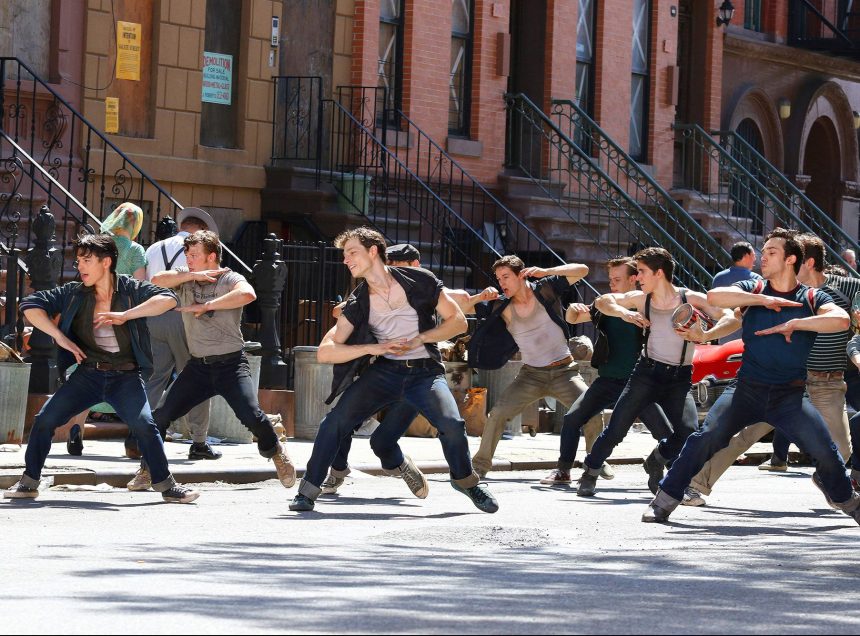
As mentioned, the scene that involves the song “America” is perhaps the biggest visual mark on the film, with visual aid of the various costumes, dancing, singing, and just overall marvel to behold, which makes such a joyous and celebration musical sequences that…. quite literally…. stands out. Thus, the film’s “behind the scenes” team, including Adam Stockhausen (production design), Rena DeAngelo (set decorations), Paul Tazwell (costume designs), the entire hair / make-up department as well as the several art direction team, for the impeccable details and spectacle visual aesthetics that make both the background’s setting (and characters) come alive with such grandiose boldness and theatrical energy. In addition, the movie’s cinematography work by Janusz Kaminski, a longtime collaborator of Spielberg, is top-notch, which definitely sells the heightened musical moments of the film and provides some great cinematic nuances to make the feature’s Broadway show roots shine within a theatrical motion picture through the usage of lightning, camera angles, and shadowing. Lastly, the film’s score, which was composed by Leonard Bernstein, is phenomenal. Naturally, the songs in West Side Story are just as iconic and timeless (as mentioned above), but are aided by Bernstein’s musical composition, which strengths the songs even more as well as the various orchestral pieces that are reminiscent the story’s traditional theater beginnings. All in all, a solid score that’s literally icing on the cake for a mesmerizing visual / technical presentation.
There are a few problems that I had with Spielberg’s version of West Side Story, with some elements still a bit wonky and others that are just untouched problematic areas. What do I mean? Well, for starters, the movie is still quite long. While the original 1961 film was indeed lengthy by having a runtime of 152 minutes, the 2021 version is 156 minutes…. a differences of four minutes, and, while that might not be a big deal for some, it still represent the musical in a lengthy runtime. This causes the film to be quite longer than it needs to be, even if some of the songs and dance numbers are rearranged and the plot having a slightly more substance. Because of this, West Side Story has a pockets of awkward pacing issues and causes a sluggishness in several areas, which makes the movie to feel longer than it should be. Thus, it even with a couple of new additions to the story, Spielberg could’ve easily trimmed down the film a good ten or so minutes and still achieve the same type of praise for his musical feature. In addition, even though the movie’s script adds more substance to both character and background aesthetics, the overall narrative beats are still primary the same, which can be both a good and bad thing, with some of the pitfalls from the 1961 one still showing up. Of course, while the Jets are a bit more liverier in this updated remake and a bit more to screen presence, the Sharks, on the other hand, are still a bit underwhelming, with more time focused on the Jets than the Sharks. Plus, there still isn’t that mentioning of the struggles and assimilation of the Puerto Rican community in New York City in the movie other than hearing about in the song “America”. Given the new cinematic platform from a famed director and the ever-changing times of today’s world for inclusion and diversity, it just seems like a missed opportunity. Plus, the somewhat heavy Latino accents for some characters is a little bit “on the nose” and, while I do understand why it may be kept in the movie (for the story’s time setting of the late 50s), it still seems a bit outdated.
As more of a personal criticism, I sort of wish that Spielberg would’ve inserted a bit more creative differences in the second half of the film. Why and how so? Well, to be honest, the latter half of West Side Story is a bit depressing / melancholy to watch, especially after the events of the big “rumble” scene. Yes, I do praise Spielberg for shifting the song “Cool” out of this portion as it felt wonky in the 1961 film, but…basically…after hearing the sound “I Feel Pretty”, which is now a right after the big fight scene, the rest of the feature is left with more somber tone. Of course, it’s a bit understandable as the story’s major plot points can not be changed, but I felt that Spielberg (and Kushner) could’ve added a bit more substance or something of creative interest to draw a better conclusion in this finale act. Heck, even the final moments could’ve added a bit more substance, which closes out much like the original. Again, it’s alright for what it is, it’s just it would’ve been nice to see something a tad different.
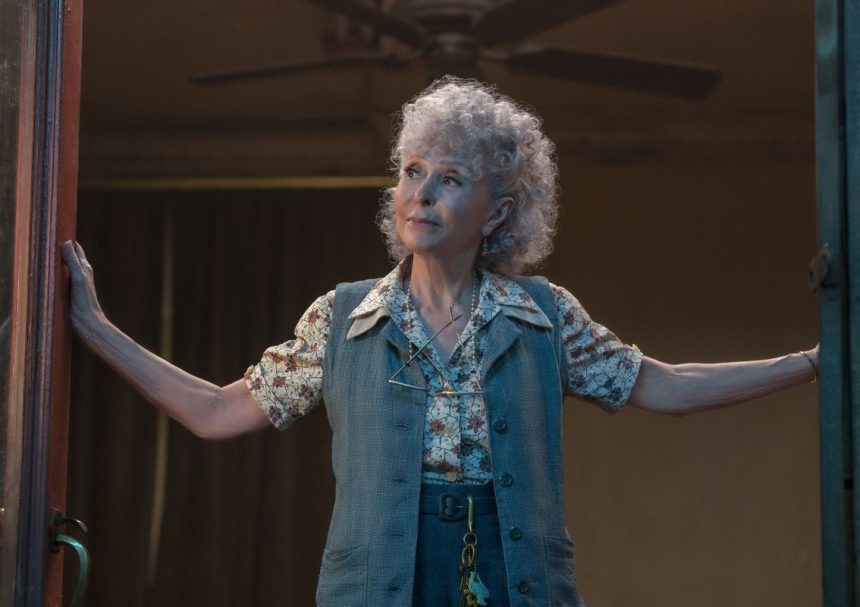
Looking beyond those points of criticisms is the film’s cast, with this updated iteration of West Side Story showcasing a diverse selection acting talents and some capable performers that help bring these iconic characters to life. Leading the charge in the movie are the two principal characters of the story (Maria and Tony), who are played by actress Rachel Zegler and actor Ansel Elgort. Interestingly, Zegler makes her theatrical feature film debut with West Side Story, and I do have to admit that she does a great job in her performance. Her musical voice is terrific and hearing her sing songs like “Tonight” as lyrical to hear as she captures the spirit of a lovely youthful maiden, who is wanting to see more to her life than what is offered. Plus, she definitely looks like what I (and many) would picture Maria from West Side Story to be, a young and wide-eyed girl. Thus, I felt that Zegler did a fine job in the role and does surpass what Natalie Wood was able to convey from the 1961 film. Of the two leads, she shines the brightest. That’s not say that Elgort, who is known for his roles in Divergent, Baby Driver, and The Fault in Our Stars, is solid in his portrayal of Tony, the former Jet ringleader. With the only disappointing aspect of Maria is that her character is still pretty much the same, Tony’s backstory is a bit more fleshed out, which provides more insight into who this young man is and what he wants out of life. While Beymer’s iteration of Tony in the 1961 movie was more of a dreamlike quality (as customary for a lead man in a musical of that time period of when the film was made), Elgort makes Tony a more subtle (almost subdued anger and regret) by ways and means of looking to shed his past transgressions of violent ways of being Jet member and looking for a better life; one that is meaningful and purposeful. Of course, there is still some “grit” to him, which throws shade on his character, but he is still a very much a likeable guy who is out looking for love. Perhaps the only downside to Elgort is (of course) the recent allegations made on him, which casts a poor light of his performance on the film, as well as the actor looking a bit more older than the rest of the cast. To be fair, Elgort still has that baby-face for a leading man, which is probably why he won the part of Tony, but, being almost a head taller than most of his male co-stars, is a bit distracting and looks older than what the character should be. He’s not as old as Beymer was in the 1961 feature, but he just looks a bit more mature than what the character should. Collectively, Zegler and Elgort definitely look cute together and do share a nice on-screen chemistry with one another, which helps buy into the characters of Tony and Maria.
Much like the 1961 version, the supporting players in 2021’s West Side Story are far more interesting, memorable, and charismatic than the actual main leads (as mentioned above), with Spielberg finding a so quality acting talent to play these iconic characters. Just like what actress Rita Moreno crafted in the 1961 film, actress Ariana DeBose shines the brightest in a very well-rounded and dynamic character performance in the role of Anita, Maria’s brother’s (Bernardo) girlfriend. While a bit unknown in the realm of both big and small screen, DeBose has made a name for herself on Broadway by appearing in such production like Bring it On: The Musical, Motown: The Musical, and Hamilton. Because of this, DeBose certainly has great screen presence throughout the entire film, which (naturally) makes her character portrayal of Anita that much more impactful. Like Moreno, DeBose makes Anita brimming with energetic vim and vigor and a passionate individual, which makes all of her scenes (be it joyful or sadness) that much more passionate and dynamic than the rest. It’s a testament to DeBose’s acting and she deserves all the praise and adoration that she has received for her role in Spielberg’s musical. Definitely hands down my favorite character in the movie as one can easily sense the love, passion, and theatrical boldness that DeBose crafts in the character; making her the most memorable player in West Side Story.
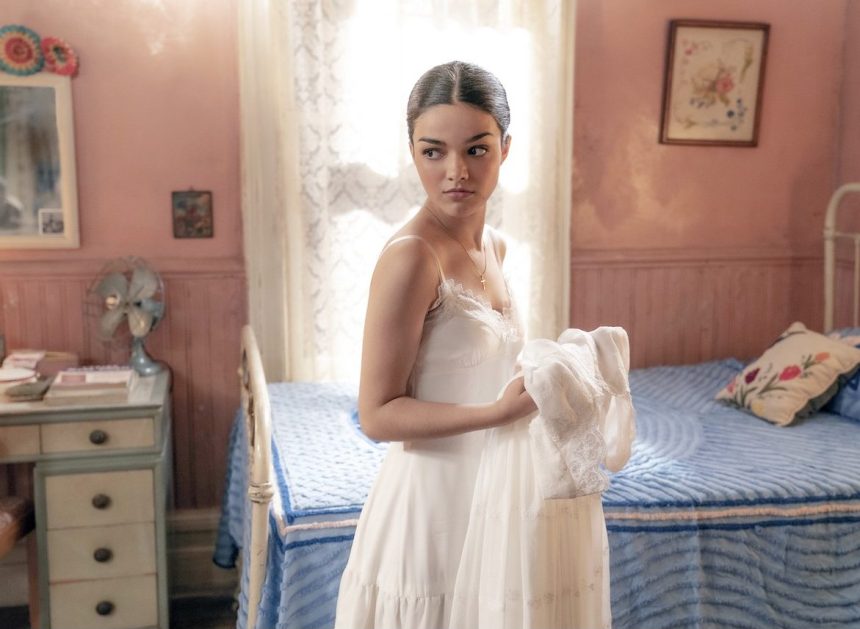
Set in a similar fashion, actors Mike Faist and David Alvarez do exceptional jobs as the proclaimed leaders of the two rival street gangs as Jets’s hotheaded Riff and the Sharks’s alpha male Bernardo. Like DeBose, Faist (Newsies and Dear Evan Hansen) and Alvarez (Billy Elliot the Musical) have a background work on Broadway, which definitely helps build their screen presence and charismatic personifications for their respective characters. In truth, both characters are fleshed out a bit more, with Riff having more of a hatred / grudge towards the Sharks than before with a more vocal mouth towards violence, while Bernardo has more of a surrogate father-like figure towards Maria; offering a parental dynamic towards the character. Together, both are to be considered the “Tybalt” of this modern-esque Romeo & Juliet story, with both men fighting passionate for their respective groups and will do anything come out on top. Of course, Bernardo is a bit more smoother, while Riff is a bit rougher, yet both men fight for what they believe in. Thus, the performances captured by both Faist, and Alvarez evokes the burning fighter intensity and charisma, which is portrayed quite well and cinematically brought to life with plenty of vigor and innovated characterization.
As mentioned above, Spielberg sort of updates the material for West Side Story to provide a bit more character dynamic within several supporting players. This is most notable in updating the character of Doc, an elderly man who owns a Candy shop and who Tony works for. In Spielberg’s version, Doc is replaced by the female character named Valentina, who is considered to be Doc’s widow who now runs the store. What definitely makes this character more interesting in this new iteration of the classic musical is the fact that actress Rita Moreno plays the role of Valentina. Unlike the original character of Doc, Valentina has a little bit more to do in the film; offering more helpful advice to Tony with his current situation, with her character being a Puerto Rican who fell in love with and married a white American. It also helps that Moreno, who is known for her roles in the 1961 West Side Story as well as Oz, The King and I, and Nine to Five, is up to the task in making this character stand out, who is terrific and plays Valentina with great poise and ease. Plus, Spielberg’s decision to give her the chance to sing in this new movie, with Moreno singing “Somewhere” instead of Tony and Maria. It’s a decision that I like and definitely has that “full circle” effect for Moreno, which helps bridges the 1961 movie to this 2021 feature.
Another supporting character that also gets elevated slightly is in the role of Chino, a friend of Bernardo in the Sharks gang as well as suitor for Maria’s love. While the character is still very much the same (the same end result from start to finish), Chino is a tad fleshed out more and has more of presence in West Side Story, with actor Josh Andres Rivera, who makes his motion picture debut with the film, giving a solid performance. Lastly, in a smaller role, Iris Menas (Ridley Jones and Madagascar: A Little Wild) makes for a good small character performance in the role of Anybody, a character that is more a misfit due the gender, with Spielberg making the role more obviously trans character rather than merely an implied tomboy-like one. Again, it’s s small change, with very little impact on the overall feature, but the inclusion differences is indeed a welcomed one in this day and age of cinema filmmaking.
Other minor supporting roles, like actor Brian d’Arcy James (Spotlight and 13 Reasons Why) as Police officer Krupke and actor Corey Stoll (Ant-Man and House of Cards) as Lieutenant Schrank are pretty much represented in the same light as before, but both actors give solid small character roles in the film. Of course, I didn’t expect these two characters to be change that much, with the only difference is that Schrank just seems a bit more forceful with the two gangs “brawling” and how they will becoming more irrelevant in a few years. Overall, both James and Stroll were good and no complaints from me.
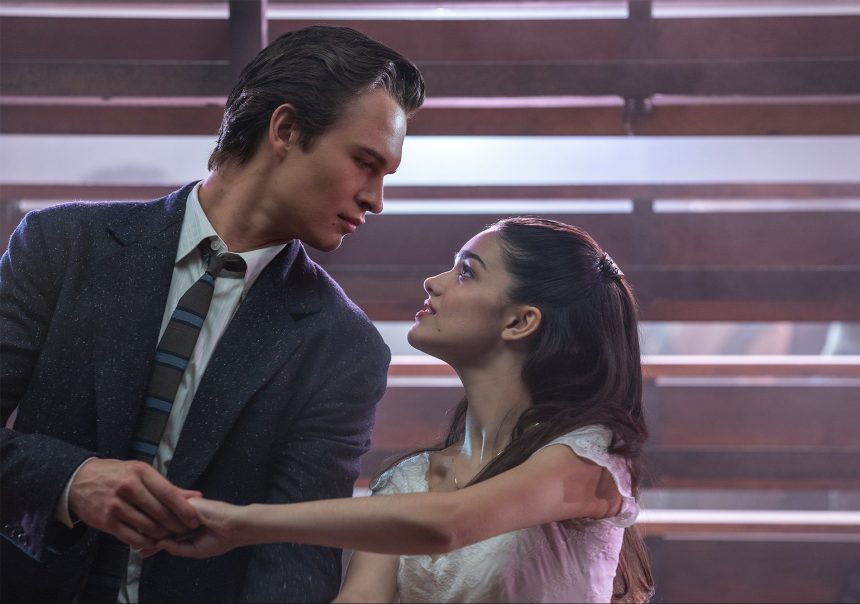
FINAL THOUGHTS
Life matters…. even more than love” a poignant sentiment that is echoed in the minds of two star-crossed lovers as they try to find way to find a romance together in amongst a heated rivalry brawl that looms large overhead in the movie West Side Story. Director Steven Spielberg latest film takes the classic Broadway musical show to a whole new level, with his film adaptation updating the already modernized Shakespearian love story. While the movie can’t escape certain inherit pitfalls from both its source material and from the 1961 version, the film still finds a wonderful display of cinematic nuances and memorable from Spielberg’s direction, more narrative substance, a fantastic presentation, solid singing talents, incredible choreography dance numbers, and a great ensemble cast. To me, I really liked this movie. There has been some divisions on this particular film adaptation, but I thought that Spielberg did a great job in shaping this musical into something that had a bit more substance, a little bit more technical flourishes, and a slightly more grittier. It’s the same musical everyone loved, but given a great cinematic makeover lift; something that enhanced and enriches this timeless love story. Plus, I thought that majority of the cast was terrific, especially Zellger, DeBose, and Faist. Personally, I believe that Spielberg’s version is the more superior to the 1961. Thus, my recommendation would be a solid “highly recommended” one, especially if you’re fan of the West Side Story musical or appreciate it musicals. In a cinematic age or remakes and revivals, few of these have the power and stamina to justify their existence. In the case of Stephen Spielberg’s West Side Story, the reasoning is sound, for it is a visual technical marvel and dazzling spectacle of music, dancing, and storytelling; a wholesome musical tale of young love, passionate ideas, and heartfelt tragedy for a new age and for generations to come.
Also, as a personal side note, West Side Story is my 625th movie review since I’ve started blogging. This is truly a huge and celebratory milestone for me! I wanted give a special thank you to all my readers, followers, and fellow bloggers for reading my movie reviews and giving me this platform to share (with you guys) my views on cinematic tales.
